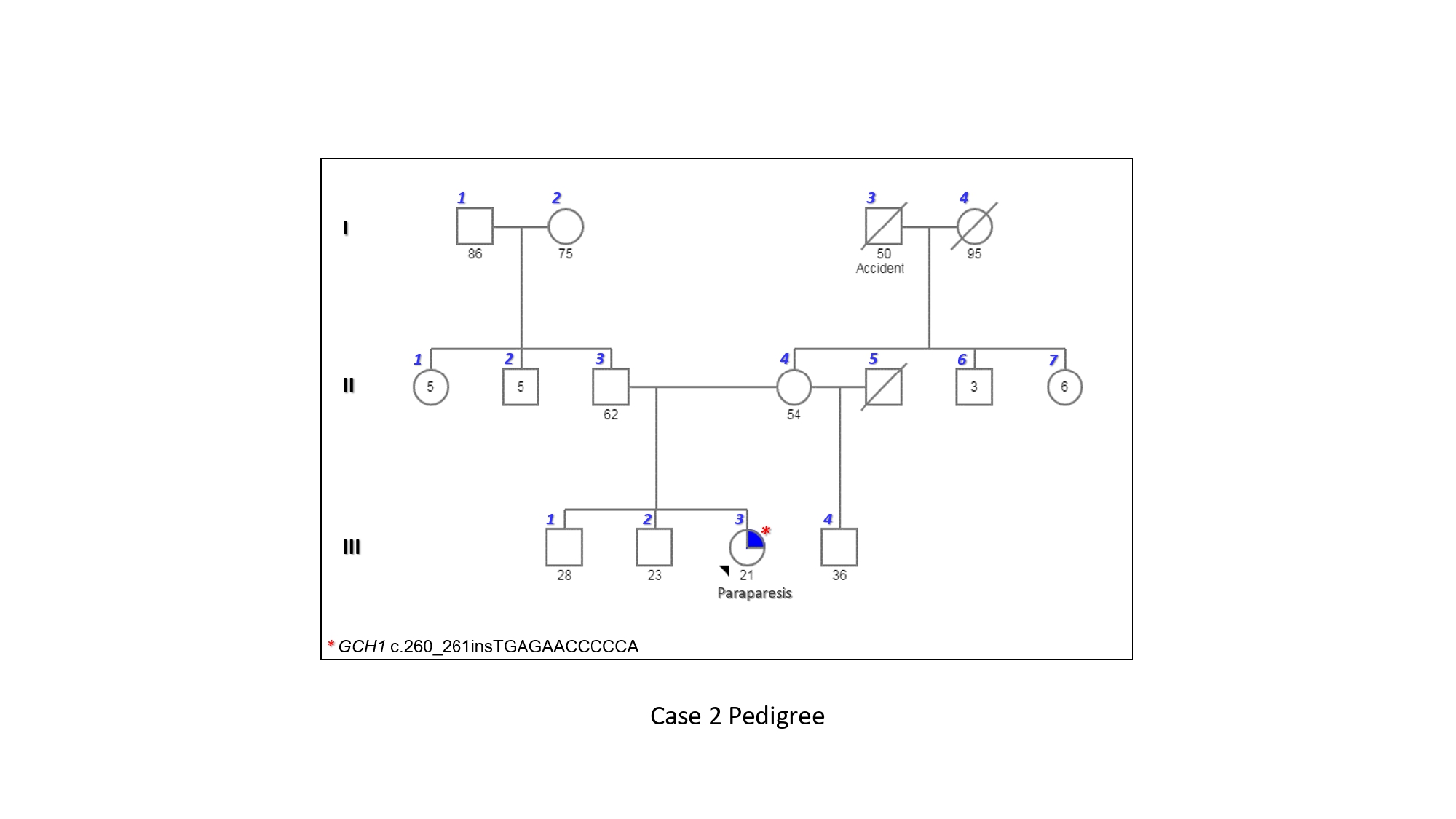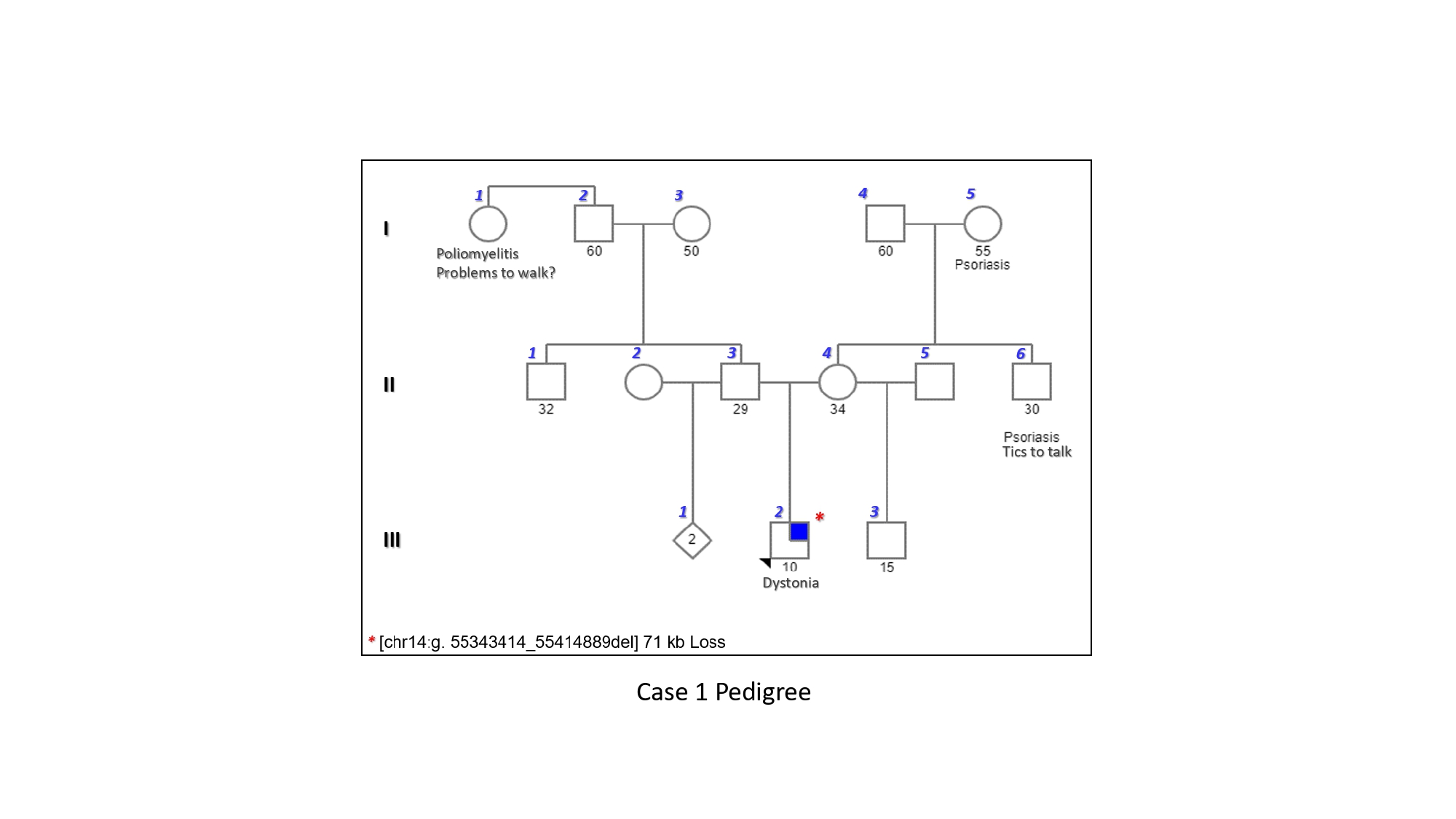Objective: To describe the clinical features and treatment response of two Peruvian patients with GHC1 dopa responsive dystonia diagnosed by whole genome sequencing.
Background: Pathogenic variants in the GCH1 gene are associated with GTP cyclohydrolase 1-deficiency. This disorder is characterized by childhood-onset dystonia and a dramatic and sustained response to low doses of levodopa. Clinical features typically include progressive gait disturbance caused by lower limbs dystonia, parkinsonism and diurnal fluctuation of symptoms. Recently, the disease spectrum has expanded to other phenotypes like adult-onset parkinsonism, symptoms simulating cerebral palsy or spastic paraplegia.
Method: Two patients were followed up at neurogenetics clinic at a tertiary specialized neurologic hospital in Lima, Peru. Molecular diagnosis was performed by whole genome sequencing through the iHope program from Illumina. Both participants and family members signed appropriate informed consents.
Results: Case 1(figure 1: III2) A 10-year-old man experienced abnormal posture of the right foot since age of 4, as well as diurnal fluctuations with evening worsening of symptoms. Neurological examination revealed dystonia in the lower right limb, which worsens with action, with an abnormal gait with dystonic posture of the right leg. WGS genetic testing found a pathogenic 71 kb deletion affecting three genes, GCH1,MIR4308, and WDHD1. The proximal breakpoint of this deletion lies in intron 1 of GCH1 resulting in deletion of exon 1. Patient was put on levodopa (125mg/day), with about 80% improvement of dystonia.
Case 2 (figure 2: III3) )A 21-year-old woman with progressive walking difficulties since age of 7, spastic gait, stumbling and frequent falling. Spasticity in lower limbs disturb walking, requiring a walker support for walking since age of 16. WGS found a heterozygous, paternally inherited in-frame insertion variant in the GCH1 gene, which is classified as likely pathogenic. Patient was put on levodopa (250mg/day), with about 70% gait improvement.
Conclusion: We report two cases with pathogenic variants at GCH1 gene, associated to generalized dystonia and spastic paraparesis phenotypes, respectively. In both cases, demonstrated significant improvement of symptoms with low doses of levodopa.
References: 1. Furukawa Y, Adam MP, Ardinger HH, Pagon RA, et al. GTP Cyclohydrolase 1-Deficient Dopa Responsive Dystonia. GeneReviews®. 2002 Feb 21 [Updated 2019 Jan 24] 2. Flotats-Bastardas M, Hebert E, Raspall-Chaure M, Munell F, Macaya A, Lohmann K. Novel GCH1 compound heterozygosity mutation in infancy-onset generalized dystonia. Neuropediatrics. 2018;49:296–7. 3. Antelmi E, Stamelou M, Liguori R, Bhatia KP. Nonmotor symptoms in dopa-responsive dystonia. Mov Disord Clin Pract. 2015;2:347–56. 4. Furukawa Y, Kish SJ. Parkinsonism in GTP cyclohydrolase I-deficient DOPA-responsive dystonia. Brain. 2015;138:e351.
To cite this abstract in AMA style:
L. Urbina-Ramirez, J. La Serna-Infantes, E. Sarapura-Castro, A. Rivera-Valdivia, E. Thorpe, D. Perry, K. Milla-Neyra, C. Galarreta, M. Dueñas-Roque, M. Cornejo-Olivas. Whole genome sequencing aids in diagnosing GCH1 dopa responsive dystonia in two Peruvian patients and influences medical management [abstract]. Mov Disord. 2021; 36 (suppl 1). https://www.mdsabstracts.org/abstract/whole-genome-sequencing-aids-in-diagnosing-gch1-dopa-responsive-dystonia-in-two-peruvian-patients-and-influences-medical-management/. Accessed March 4, 2026.« Back to MDS Virtual Congress 2021
MDS Abstracts - https://www.mdsabstracts.org/abstract/whole-genome-sequencing-aids-in-diagnosing-gch1-dopa-responsive-dystonia-in-two-peruvian-patients-and-influences-medical-management/


